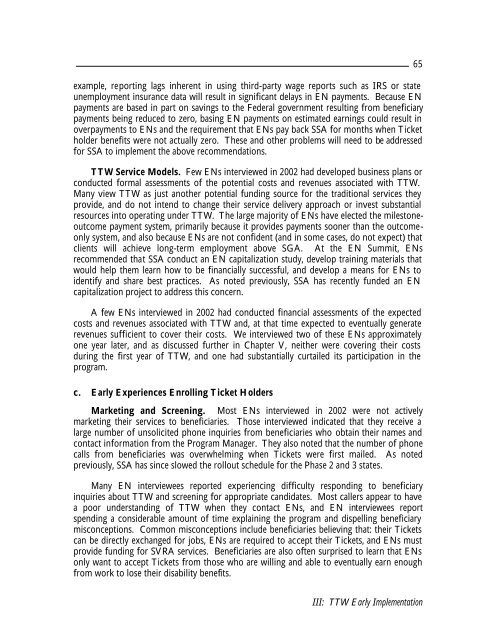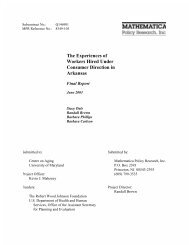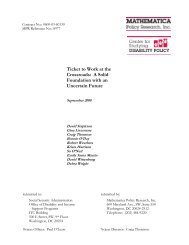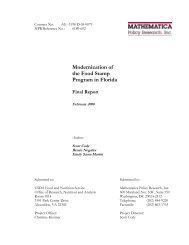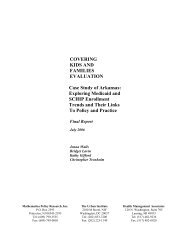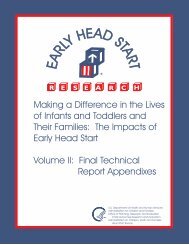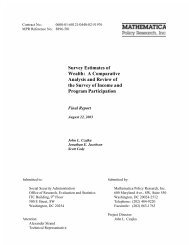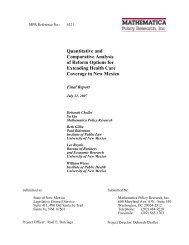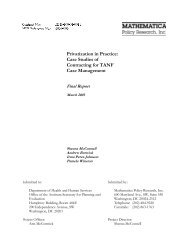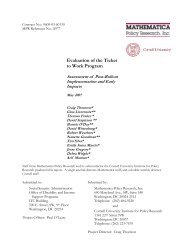Evaluation of the Ticket to Work Program Initial Evaluation Report
Evaluation of the Ticket to Work Program Initial Evaluation Report
Evaluation of the Ticket to Work Program Initial Evaluation Report
Create successful ePaper yourself
Turn your PDF publications into a flip-book with our unique Google optimized e-Paper software.
example, reporting lags inherent in using third-party wage reports such as IRS or state<br />
unemployment insurance data will result in significant delays in EN payments. Because EN<br />
payments are based in part on savings <strong>to</strong> <strong>the</strong> Federal government resulting from beneficiary<br />
payments being reduced <strong>to</strong> zero, basing EN payments on estimated earnings could result in<br />
overpayments <strong>to</strong> ENs and <strong>the</strong> requirement that ENs pay back SSA for months when <strong>Ticket</strong><br />
holder benefits were not actually zero. These and o<strong>the</strong>r problems will need <strong>to</strong> be addressed<br />
for SSA <strong>to</strong> implement <strong>the</strong> above recommendations.<br />
TTW Service Models. Few ENs interviewed in 2002 had developed business plans or<br />
conducted formal assessments <strong>of</strong> <strong>the</strong> potential costs and revenues associated with TTW.<br />
Many view TTW as just ano<strong>the</strong>r potential funding source for <strong>the</strong> traditional services <strong>the</strong>y<br />
provide, and do not intend <strong>to</strong> change <strong>the</strong>ir service delivery approach or invest substantial<br />
resources in<strong>to</strong> operating under TTW. The large majority <strong>of</strong> ENs have elected <strong>the</strong> miles<strong>to</strong>neoutcome<br />
payment system, primarily because it provides payments sooner than <strong>the</strong> outcomeonly<br />
system, and also because ENs are not confident (and in some cases, do not expect) that<br />
clients will achieve long-term employment above SGA. At <strong>the</strong> EN Summit, ENs<br />
recommended that SSA conduct an EN capitalization study, develop training materials that<br />
would help <strong>the</strong>m learn how <strong>to</strong> be financially successful, and develop a means for ENs <strong>to</strong><br />
identify and share best practices. As noted previously, SSA has recently funded an EN<br />
capitalization project <strong>to</strong> address this concern.<br />
A few ENs interviewed in 2002 had conducted financial assessments <strong>of</strong> <strong>the</strong> expected<br />
costs and revenues associated with TTW and, at that time expected <strong>to</strong> eventually generate<br />
revenues sufficient <strong>to</strong> cover <strong>the</strong>ir costs. We interviewed two <strong>of</strong> <strong>the</strong>se ENs approximately<br />
one year later, and as discussed fur<strong>the</strong>r in Chapter V, nei<strong>the</strong>r were covering <strong>the</strong>ir costs<br />
during <strong>the</strong> first year <strong>of</strong> TTW, and one had substantially curtailed its participation in <strong>the</strong><br />
program.<br />
c. Early Experiences Enrolling <strong>Ticket</strong> Holders<br />
Marketing and Screening. Most ENs interviewed in 2002 were not actively<br />
marketing <strong>the</strong>ir services <strong>to</strong> beneficiaries. Those interviewed indicated that <strong>the</strong>y receive a<br />
large number <strong>of</strong> unsolicited phone inquiries from beneficiaries who obtain <strong>the</strong>ir names and<br />
contact information from <strong>the</strong> <strong>Program</strong> Manager. They also noted that <strong>the</strong> number <strong>of</strong> phone<br />
calls from beneficiaries was overwhelming when <strong>Ticket</strong>s were first mailed. As noted<br />
previously, SSA has since slowed <strong>the</strong> rollout schedule for <strong>the</strong> Phase 2 and 3 states.<br />
Many EN interviewees reported experiencing difficulty responding <strong>to</strong> beneficiary<br />
inquiries about TTW and screening for appropriate candidates. Most callers appear <strong>to</strong> have<br />
a poor understanding <strong>of</strong> TTW when <strong>the</strong>y contact ENs, and EN interviewees report<br />
spending a considerable amount <strong>of</strong> time explaining <strong>the</strong> program and dispelling beneficiary<br />
misconceptions. Common misconceptions include beneficiaries believing that: <strong>the</strong>ir <strong>Ticket</strong>s<br />
can be directly exchanged for jobs, ENs are required <strong>to</strong> accept <strong>the</strong>ir <strong>Ticket</strong>s, and ENs must<br />
provide funding for SVRA services. Beneficiaries are also <strong>of</strong>ten surprised <strong>to</strong> learn that ENs<br />
only want <strong>to</strong> accept <strong>Ticket</strong>s from those who are willing and able <strong>to</strong> eventually earn enough<br />
from work <strong>to</strong> lose <strong>the</strong>ir disability benefits.<br />
65<br />
III: TTW Early Implementation


